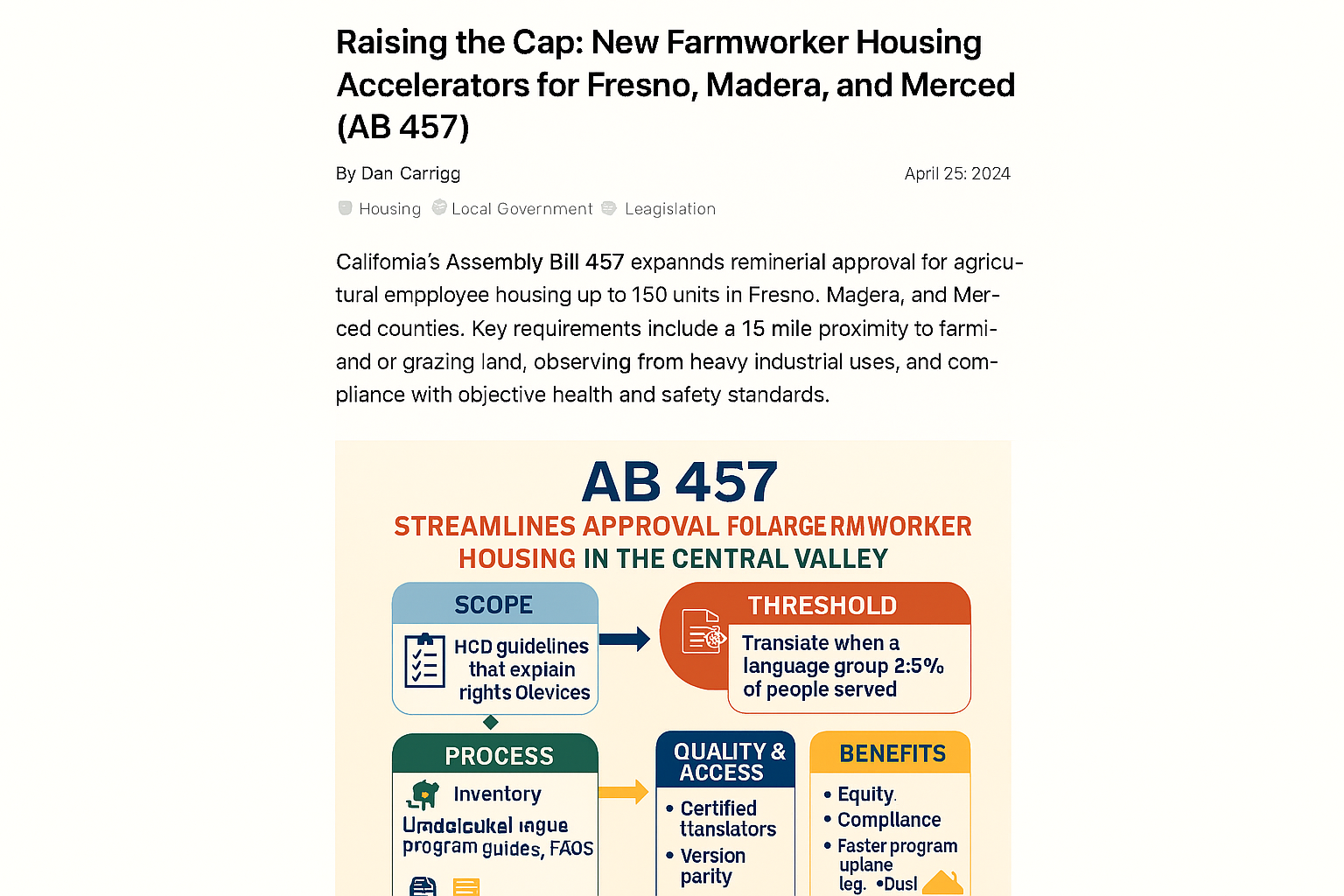Summary:
California’s Assembly Bill 457 (AB 457), authored by Assemblymember Esmeralda Soria and signed into Law by Governor Gavin Newsom on 10 October 2025, addresses one of the most pressing housing challenges in the state: the severe shortage of safe, affordable housing for farmworkers in the Central Valley. The bill expands an existing streamlined approval process for agricultural employee housing and introduces critical reforms to accelerate development in Fresno, Madera, and Merced counties. This is significant because it directly addresses the housing crisis faced by farm workers, who are the backbone of California’s agricultural economy.
What AB-457 Does
AB-457 modifies Health and Safety Code §17021.8 to:
1. Expand Geographic Scope
o Previously limited to Santa Clara and Santa Cruz counties, the streamlined approval process now applies to Fresno, Madera, and Merced—regions with some of California’s largest farmworker populations.
2. Increase Project Size
Raises the cap on eligible developments from 36 units to 150 units for projects in these counties, enabling larger-scale housing solutions that attract financing and meet demand.
3. Streamlined, Ministerial Approval
o Projects meeting statutory criteria are approved ministerially, without discretionary review or conditional use permits—significantly reducing delays.
4. CEQA Exemption
o Qualifying projects are exempt from the California Environmental Quality Act (CEQA), eliminating one of the most time-consuming hurdles in housing development.
5. Eligibility Criteria
o Must be within 15 miles of farmland or grazing land, not adjacent to heavy industrial sites, and comply with health, safety, and affordability standards.
Requires affordability covenants to ensure units remain affordable to lower-income agricultural workers for at least 55 years.
Why It Matters
Farmworkers are the backbone of California’s $50 billion agricultural economy, yet they face chronic housing insecurity. Many live in overcrowded, substandard conditions far from job sites. By enabling larger, faster, and closer-to-work housing developments, AB 457:
- Reduces Commutes: Housing within 15 miles of farms cuts transportation costs and time.
- Improves Living Standards: Larger projects enable the incorporation of modern amenities and enhanced infrastructure.
- Supports Workforce Stability: Adequate housing helps retain labor critical to food production.
Impact on Local Governments
AB 457 declares farmworker housing a matter of statewide concern, superseding conflicting local zoning rules, and applies to charter cities. While local agencies can levy fees to support implementation, the Law specifies no state reimbursement for new mandates, raising concerns about resource strain. This means that local governments may need to find alternative sources of funding to support the implementation of the bill, which could potentially strain their resources.
Challenges and Criticisms
- Infrastructure Costs: Connecting water, sewer, and utilities on agricultural land remains expensive.
- Community Integration: Larger developments may face resistance over traffic and land-use impacts.
- Local Capacity: Smaller counties may struggle to expedite permitting without additional funding.
Legislative Journey
- Introduced: 6 February 2025
- Passed Assembly: 1 May 2025 (76-0 vote)
- Passed Senate: 25 August 2025 (37-0 vote)
- Signed into Law: 10 October 2025
Looking Ahead
AB 457 builds on prior reforms, such as AB 1783 (2019) and AB 3035 (2024), signaling a trend toward state-led streamlining of rural housing. Expect increased interest from nonprofit developers and housing authorities, who will leverage this Law to deliver multi-phase projects near major agricultural corridors.
Key Takeaways
- 150-unit cap for Fresno, Madera, and Merced farmworker housing projects.
- Ministerial approval + CEQA exemption = faster timelines.
- Statewide concerns override local zoning conflicts.
- Addresses the critical housing shortage for agricultural workers.
